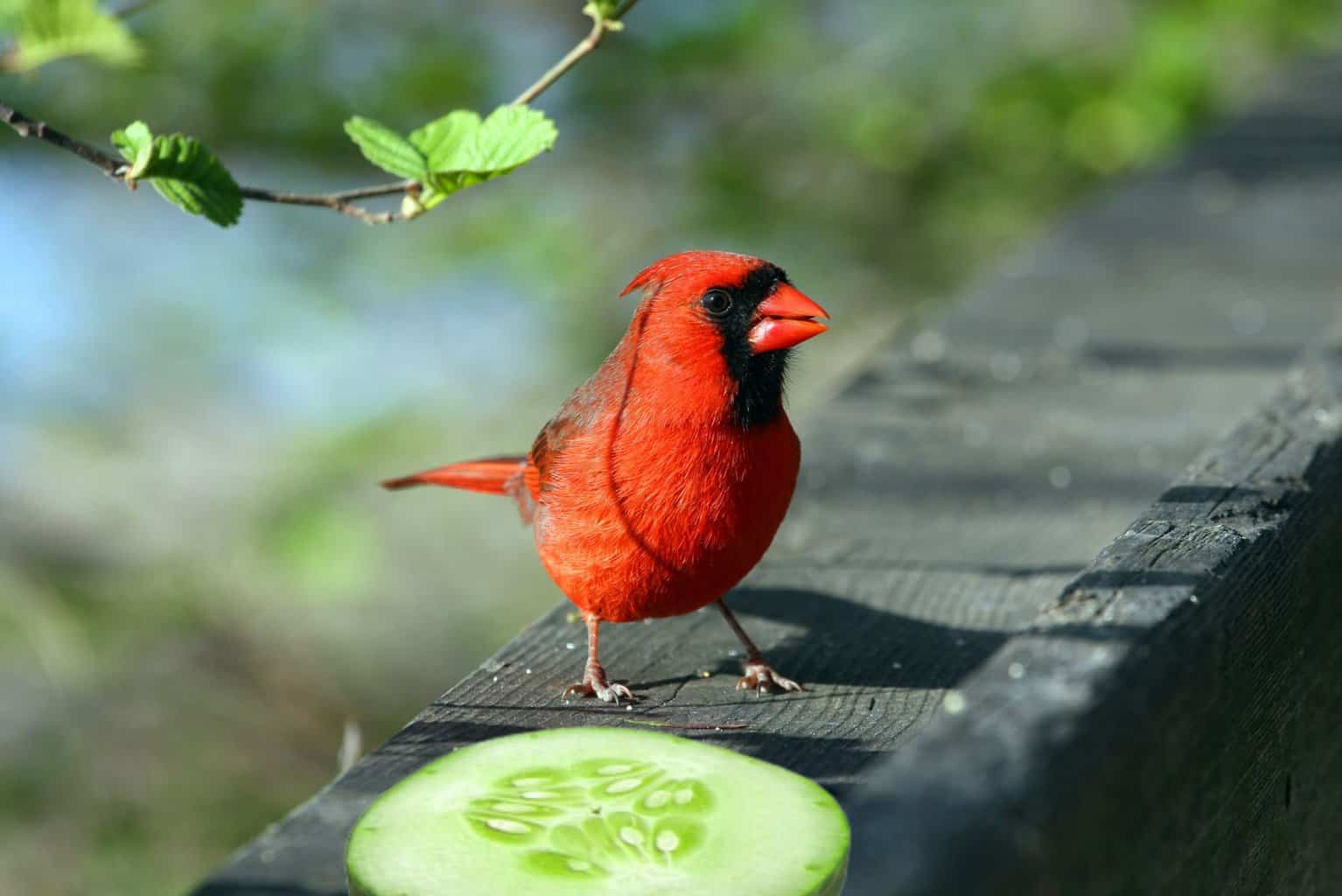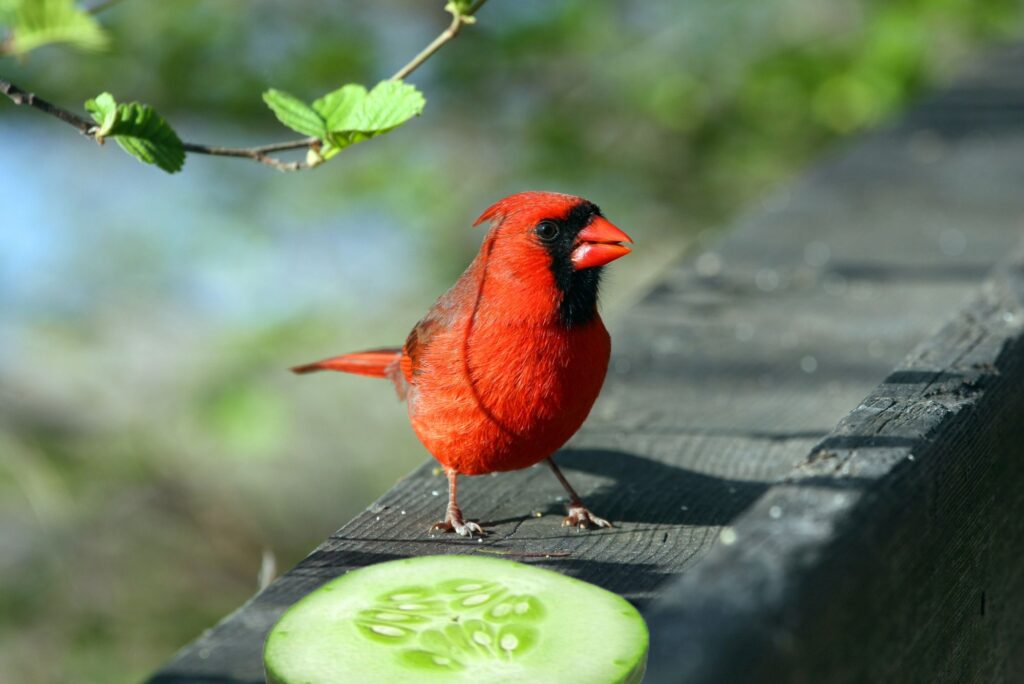Many of us enjoy cucumber in a fresh summer salad. But is cucumber also food that wild birds in your garden will like to eat? Do birds eat cucumber, and if so, is it good for them?
Cucumber is not always a favorite with birds, and if you leave some out in your garden, whether or not you have any takers will depend on which birds are present in your area.
However, some birds eat cucumber and can be pests for gardeners and take cucumber when it is offered.
Some birds will peck at cucumbers on the vine. However, typically, they will do so not for the nutrients and sustenance cucumber can provide, but for its impressively high water content.
If birds peck at cucumbers growing in your garden, this is a sign that there is not enough water around. The best thing that you can do is provide a water source for them elsewhere in your garden. A wildlife pond is a wonderful feature for a bird-friendly garden, but any water provided over the summer months will benefit your feathered friends.
Which Birds Eat Cucumber?
Robins, starlings, crows, and gulls are some birds that might snack on some cucumber in your garden. Birds may occasionally pick at cucumbers while they are on the vine, but mostly, the birds commonly found in a garden will only eat cucumber when it is placed out for them to eat.
If you have pet birds, like parrots, for example, then these will also sometimes eat cucumber when it is offered. The cucumber’s soft and watery flesh is easy for them to eat and digest, so it may be accepted even by fussier eaters.
Which Parts of a Cucumber Do Birds Eat?
Larger birds can peck through the skin of the cucumber to get at the watery flesh and seeds within, but smaller birds may only have a taste if you cut up a cucumber and give them a clear look at the bits that they may like to eat.
Birds will often eat cucumber seeds and flesh, and some will eat cucumber skin, too.
Birds may occasionally also pluck at the leaves on a cucumber vine and peck off the blooms before they get the chance to germinate. But these are not common issues and are less likely for food and more likely to be a sign of other problems, like water shortage.
Is Cucumber Good for Birds?
If you are considering leaving some cucumber out for the birds, the good news is that it is utterly harmless to avian species and can do them some good when offered in small amounts.
Cucumber can provide birds with some of what they need when included as a small, supplemental part of a balanced diet. However, this fruit is not known for its nutrient content and is notable only for its vitamin K content.
Raw cucumber (with its skin) is 95% water, 4% carbohydrates, 1% protein, and contains little fat. The water content can help keep birds hydrated and can help improve the bowel movements and digestive health of pet birds like parrots. But too much can lead to loose and watery stools.
The key thing is to remember that birds will need other foods with plenty of protein, fats, and nutrients to remain healthy. So cucumber, like other supplemental foods, should only ever be offered as a healthy snack from time to time.
Feed Only Fresh Cucumber to Birds
Make sure that any leftover cucumber you are considering feeding to birds in your garden is fresh and not rotting.
Spoiled food can pose a risk to the birds in your garden, so it is important only to offer fresh cucumber. If you would not eat the cucumber, it should not be offered to birds, either.
So if the cucumber is getting old, don’t leave it out for the birds to eat. Add it to your composting system instead.
Peel Waxed Cucumbers Before Feeding Them to Birds
Another thing to note is that many of the cucumbers you can buy in the stores have a waxy coating applied to the skin. The coating is added to increase the shelf life of the cucumbers and make them look better.
This outer layer consists of food-grade wax approved by the FDA, but I still don’t select any product that has been waxed for myself, and I would not feed it to birds either.
Waxes are petroleum based – contributing to the climate crisis. They can trap pesticide residue and pathogens under the surface and may contain added chemicals like fungicides. Waxes can also contain ethyl alcohol (ethanol) and casein, which is linked to a common allergen.
It can also potentially block some birds’ bowels or lead to crop compaction issues. So if you have bought waxed cucumbers from the store, peel them before you feed them to the birds.
The wax is not easy to remove with hot water or scrubbing, so peeling them is the only surefire way to make sure that you get rid of it all. But better yet, avoid buying waxed cucumbers altogether.

Feed Only Organic Cucumbers to Birds
At the end of the day, the only type of cucumber you should ever consider feeding to birds is organic cucumber, ideally, one that you have grown yourself at home. But where this is not possible, choose one grown naturally and sustainably as close to home as possible.
A cucumber that is not organic can contain a harmful residue of chemicals used in production on its skin. Unfortunately, many of the cucumbers you will find in supermarkets and stores will have been grown in ways that are not kind to the environment and may pose a health risk.
These pesticides and herbicides may pose a risk to birds and us and are retained even after a cucumber is washed. But it is even more problematic when feeding birds because they are smaller, and these toxic substances’ effects can be much worse on their tiny bodies.
Organic cucumbers are, unfortunately, more expensive. But going organic is the only choice if you want to do the right thing regarding the health of birds you want to feed and bird species in the wider world.
How To Serve Cucumber to Birds
Place cucumber on a platform feeder, bird table, or other off-the-ground feeding station, and several birds may eat some. But you are likely to have the largest number of takers if you place some cucumber on the ground, where ground-feeding species can get at it.
Chop the cucumber into pieces so that the flesh within is on display and can be accessed by as wide a range of birds as possible.
As mentioned above, you may find that birds don’t pay any attention to the cucumber treat you have left out, especially if there are other food sources and water. But if you have some leftover organic cucumber, then there is no harm in leaving a little out to share with the birds in your garden.

